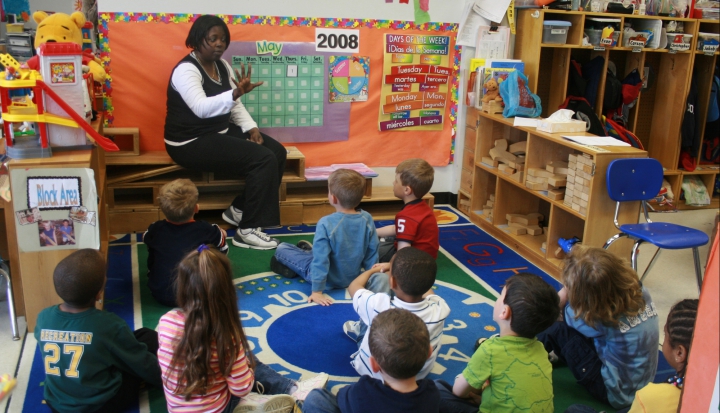How much do you remember about your first day of kindergarten? That might depend on how good your memory is and how many years ago it was, but it also might have something to do with what you were doing in the years prior. For some children, kindergarten is their first foray into the world of education, their first time away from home, their first experience inside a classroom alongside other kids. That’s how it was for me, and I know it was a big adjustment that took some getting used to. But for those whose parents are able to afford a pre-kindergarten education, that first day of kindergarten is less a rite of passage than the next step in an educational experience that’s already well underway.
But all of that may change, as the push to make pre-k programs universally available to all families continues to gain steam. Several U.S. cities (and some others around the world) have already experimented with state-funded pre-k programs, and several states are taking a serious look at the issue. President Barack Obama has also advocated for state-sponsored pre-k with an offer of federal assistance, which the president proposed funding through increased taxes on tobacco products.
New York City has become the latest battleground in the debate, with Mayor Bill de Blasio making a big push to offer universal pre-k to families in the city. New York’s Gov. Andrew Cuomo wants to make state-funded pre-k a reality too, though he and de Blasio disagree on how it should be funded. A new Quinnipiac poll shows that 86 percent of New Yorkers support the idea and are ready for a realistic plan to make it happen.
There’s good reason the concept has so much support: Research published by groups like the Pew Charitable Trusts and the Stand for Children Leadership Center shows the many benefits of early childhood education and indicates that kids who start at the kindergarten level without attending pre-k are at a major disadvantage. Getting an earlier start to their education may give kids–especially those coming from the lower end of the economic spectrum–a real opportunity to succeed. And for parents, there’s an obvious benefit as well. With the majority of U.S. families having two working parents as a necessity to pay the bills, the kids have to go somewhere during the day. And the ever-increasing costs of child care are a serious burden on working families, leaving a lot of parents with some tough economic decisions to make.
So where does the Catholic Church fit in? Supporting children’s education and development and helping to promote family life are important issues for the church, and it seems like they should be out at the forefront of this debate. (And as we reported last year, many struggling Catholic families want to hear more from their church about the challenges of modern family life, as does columnist Kevin Clarke.) The church has mostly remained quiet about the issue, but finally a prominent voice has stepped up to back the pre-k proposal.
New York’s Cardinal Timothy Dolan has publicly joined Mayor de Blasio in the effort to make universal pre-k a reality, offering up the city’s Catholic schools as a resource to help create enough classroom space for every child (just one of the potential challenges the program faces). From Dolan’s perspective, it must seem like a win-win: If the city is paying the bill, it puts some much needed funding into New York’s Catholic schools and gets more children into their classrooms, while at the same time offering some relief to struggling parents and a good educational foundation for children. (Dolan has wisely avoided weighing in on where the funding should come from, however.)
This kind of church-state pairing will always have its share of critics, but in this case there is a clear benefit for the common good. If it ends up being a success in New York, perhaps other church leaders will join in and support the efforts to extend pre-k to more children in other parts of the country–just think of how many Catholic schools could benefit from filling classrooms with young students and how many parents and children would benefit from such opportunities. That’s the kind of pro-family initiative that Catholics are just waiting for the church to move forward on.
Flickr image cc by woodleywonderworks













